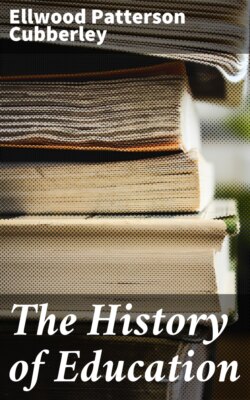Читать книгу The History of Education - Ellwood Patterson Cubberley - Страница 70
На сайте Литреса книга снята с продажи.
QUESTIONS ON THE READINGS
Оглавление1. Distinguish between song and grammar schools (70), and state what was taught in each. Do we have any modern analogy to the same teacher teaching both schools, as was sometimes done?
2. Distinguish between monastic and episcopal (cathedral) schools (71). When was the great era of each? How do you explain the change in relative importance of the two?
3. Explain the process of evolution of a parish school out of a chantry school.
4. What was the nature of the cathedral school at Salisbury (72)?
5. What type of a school was provided for in the Aldwincle chantry (73)? Why was it not until after the twelfth century that the endowing of schools (73) began to supersede the endowing of priests, churches, and monasteries?
6. How do you explain the need for so many years to master the Seven Liberal Arts (74)?
7. Into what subjects of study have we broken up the old subject of grammar, as described by Quintilian (76), and how have we distributed them throughout our school system? Is technical grammar at present taught in the best possible place?
8. What stage in scientific knowledge do the selections from Anglicus (77 a-b) indicate? What rate of scientific progress is indicated by its translation and length of use?
9. What scope of knowledge is represented in the library (78) of the tenth-century schoolmaster? What does the list indicate as to the state of learning of the time?
10. Picture the manners and morals of a time which called for the proclamation of a Truce of God (79). Would the rate of progress of civilization and the rate of elimination of warfare up to then, and since, indicate that the Church has been very successful in imposing its will?
11. Show how Chivalry was made a great asset to the Church (80).
12. How do you explain the much greater simplicity of the church service of modern Protestant churches than that of the Roman (81) or Greek Catholic churches?
13. Explain the form of mild compulsion toward learning which the diocesan council of Winchester (82) attempted to institute.
14. Is the modern state teacher's certificate a natural outgrowth of the mediaeval licenses (83) to teach grammar and song? Why did the Church insist on these when Rome had not required such?
15. Show how the modern oath of office of a teacher, and the possibility of dismissal for insubordination, is a natural development from the oath of fealty and obedience (84 b) of the mediaeval teacher? Is this true also for our modern notices of appointment (84 a)?
